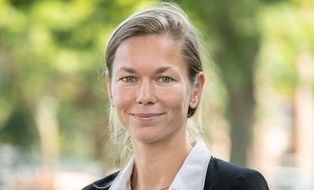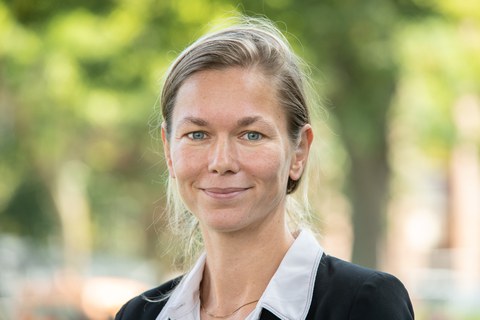Mar 06, 2023
A closer look at our newly appointed professors: Nicole Raschke, Chair of geographical education
Since 01.11.2022 Prof.in Dr. Nicole Raschke is head of the professorship for Geographical Education at the Faculty of Environmental Sciences. The professorship emerged from the junior professorship for Didactics of Geography and Environmental Communication. To satisfy the curiosity about the new colleague, she answers some short questions. In the following, Prof.in Raschke provides insights into her work in research and teaching.
- What are your main research interests?
Based on the focus on environmental education and education for sustainable development during my PhD, my research is concerned with emancipatory, transformative geographic education. This also touches on foci such as research-based learning, out-of-school learning, and digitization in geographic education contexts. As a subject didactician, I work at the interface of research and practice.
- What is your vision for the professorship? (for research and teaching)
In my research, I am concerned with how action-oriented and participatory educational concepts that emphasize active involvement, direct experience, and critically reflective experiences of self-efficacy, and that promote maturity in coping with multiple societal challenges, can be enabled and designed in different contexts. I am guided by the fundamental question of what relevance (geographic) education develops in the context of a societal transformation. I have the vision to pursue these questions in inter- and transdisciplinary contexts and to design learning landscapes at the same time.
In my teaching I would like to train future teachers of geography in such a way that they can recognize the relevance of geography in the context of societal crises and challenges and are able to develop stimulating, appropriate and methodically exciting learning opportunities. This also means that you must critically examine your own experiences in the school context, question your understanding of your role, and develop skills to deal well with uncertainties, insecurities, and contradictions inherent in pedagogical action in general and in geographic educational contexts in particular.
- Where did you last teach/research/live?
In Dresden, I was a junior professor for didactics of geography and environmental communication at the TU.
- What was your dissertation topic?
"Environmental Education in China. Exploratory Studies in Green Schools."
I worked out the nature of state-initiated or state-sponsored environmental education in China and visited numerous schools in an intensive field research phase, observed lessons, conducted interviews with teachers and school administrators, interviewed students and got to know numerous projects. Especially because in the context of sustainable or socio-ecological development it is often about guiding principles that have a global claim to validity, it seemed important to me to experience, to show and also to acknowledge how contextualized, embedded and concretely situated especially educational matters are. Through "the detour via China" I became aware of very fundamental questions that still occupy me today, such as the understanding of nature and culture and what role this actually plays in geographic education.
- What was your best experience during your studies?
For me, studying was a great, exciting and, from today's perspective, almost carefree time of learning and trying things out. I particularly remember the time in China, where I spent a semester abroad, my internships at various schools and the main excursion in which we traveled from Munich through South Tyrol to Venice.
- What was your most horrible experience during your studies?
Horrible might not be the right word, but nerve-wracking were definitely the exams. I preferred writing term papers.
- When did you know: "I want to become a professor!
I didn't actually consider it until quite late, i.e. not until I was a junior professor. Because of the great uncertainties in the university system, I went into teaching after my doctorate and worked as a teacher. That was great fun for me. However, scientific work had never completely left me, I continued to follow the discourses, went to conferences and was also involved in some publications, e.g. textbooks. When the junior professorship was advertised in 2017, I applied and got the chance. Everything had then worked out well and felt right, so it seemed more and more attractive for me to pursue a professorship.
- What is always on your desk in any case?
In addition to the usual work tools such as a monitor and computer, I use a notebook that is always on my desk. There's also a photo of my family and usually a cup of tea or coffee.
- What has surprised you positively about the TUD campus?
I've probably been here at TUD too long for that, so I don't have an answer.
- How well do you know Dresden?
I grew up in Dresden, love living here and would say I know the city very well.
- Do you have a recommendation?
I guess it depends for whom and what occasion. The Elbe meadows and the Dresden Heath are among my favorite places. I would also recommend vantage points that offer a view over the city, such as a ride on the suspension railroad or funicular in Loschwitz, the Proschhübel in the north of Dresden, or a walk to the Babisnauer Pappel in the south of Dresden.
Many thanks to Prof.in Raschke for the insights into your work.
 © TU Dresden
© TU Dresden
Inhaberin der Professur
NameProf. Dr. Nicole Raschke
Send encrypted email via the SecureMail portal (for TUD external users only).
Visiting address:
Hülßebau, HÜL / O356 Helmholtzstraße 10
01069 Dresden
Office hours:
- Monday:
- 13:30 - 14:30
- und nach Vereinbarung

